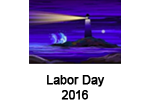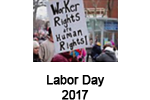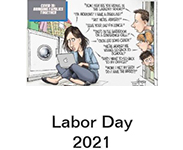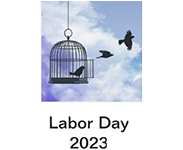An Attorney to Fight for You!
Affordable Rates
Unemployment Hearings
I have represented employees in over 750 unemployment hearings before Administrative Law Judges/ Referees with the Illinois Department of Employment Security (“IDES”) and other states, as well as in numerous appeals to the IDES Board of Review – and I have a tremendously good track record.
Over and over again my involvement in representing claimant employees has resulted in our winning and my clients receiving their unemployment compensation benefits. In particular, I can more than level the playing field, and I can give you the advantage at the unemployment hearing.
Typical IDES Referee Hearing claims involve whether or not an employee has voluntarily left his or her employment (601) or whether or not the employee was discharged as a result of the employee committing misconduct (602).
In a hearing where misconduct is claimed, the burden of proof is on the employer to prove misconduct. Although an employee may very well have made a mistake during his/her employment that led to the employer terminating that employee, the employer needs to show not merely that the employee was negligent but rather that the employee’s conduct rose to the level of constituting misconduct – which is a substantially higher burden.
In resignation cases (which are very difficult to win because the IDES does not like to give unemployment compensation benefits to employees who voluntarily leave their employment) the burden of proof is on the employee to prove either that the employee’s leaving of his/her employment was for good cause attributable to the employer or that the employee’s leaving was due to a documented health reason.
Individuals should realize that the Referee Hearings (which are usually conducted by telephone) are actual hearings (mini-trials) with evidence taken and with there being numerous unwritten (or difficult to find) rules for how the hearings are conducted. The employer is frequently represented by either an attorney or by a non-attorney representative service, and so an employee who does not have a representative is at a substantial disadvantage.
- Be advised that Employers also frequently engage in certain tricks/ dirty tricks (from: sending documents at the last moment, or just submitting documents to the IDES Local Office with their Protest and not sending them to the Claimant; to changing at the hearing the claimed reason for termination from what was verbally told to the Claimant at termination, or coming up with/using multiple claimed reasons for termination, or bringing out alleged Claimant wrongdoing from years ago; to trying to use hearsay upon hearsay evidence to support their allegations; to trying to use at the hearing claimed employer policy documents that the Claimant may never have seen during the Claimant’s employment; and more), and so if you do not have an attorney who is familiar and skilled at confidently counter-acting such tricks then you will be at a severe disadvantage.
During the hearing you will have an opportunity to give testimony on questioning from the IDES Hearings Referee and follow-up questioning from your attorney (if you have an attorney). If you don’t have an attorney then it is likely that relevant information potentially helpful to your position may not come out during the hearing.
The Employer’s representative will also be able to cross-examine you (ask you questions), and you (or your attorney, if you have one) will likewise be able to cross-examine the employer’s witnesses. Note, in this regard, that most claimant employees do not have experience/ skill in cross-examination, and so without having an attorney the employee is losing out on a big opportunity to draw out inconsistencies in the Employer’s witnesses’ testimony and otherwise show that the Employer’s witnesses are not being truthful.
Documents can also be introduced during the hearing, but you need to follow the IDES’s procedures (they have to be sent to the Hearings Referee and to the Employer/ Employer’s representative so that they are received at least 24 hours before the hearing). In this regard, you may have excellent documents showing the truth of your position, and that the Employer is lying, but if you don’t follow the IDES-required procedures then you will not be able to use those documents at the hearing, and they will not do you any good, potentially to your great detriment.
If you have applied for unemployment benefits/ have an unemployment hearing coming up then – whether you have an attorney or not – toward your being best prepared you certainly should see the following very helpful linked information that I have written:
- Top 10 Tips for Success at Your Unemployment Hearing
- Top Reasons Why You Should Have An Attorney (Preferably David Porter) Represent You at Your Unemployment Hearing
Contrasts Between Illinois, Indiana and Wisconsin on Whether a Claimant Can Receive Unemployment Benefits at the Same Time As Receiving Severance Payments Without Subtractions
- In Illinois a Claimant employee can receive unemployment benefits at the same time that the Claimant/ former employee is receiving severance payments, and there will be no subtraction for severance payments from the IDES benefits that the Claimant is receiving. The rationale for this is that the severance payments that an employee is receiving is not for work done after the end of the Claimant’s employment.
- By contrast to how Illinois does it (and despite the above rationale), in both Indiana and Wisconsin the state unemployment offices will subtract severance payments from any weekly unemployment compensation benefits that a Claimant/ former employee may receive for that week.
- As a result, if your unemployment compensation benefits are coming from Indiana or from Wisconsin (note that the state unemployment office in Wisconsin mainly refers to severance payments somewhat misleadingly as “termination pay”), then if possible it would be best for the Claimant/ former employee if the severance payment(s) were paid earlier in a lump sum rather than spread out over a period of weeks or months.
Certain Deceptive Practices by Employers
Some Employers deceptively make announcements to their employees asking for volunteers to be laid-off and receive severance. In such situation, if an employee elects to be laid-off rather than continuing their employment, then the employee likely may not be eligible for unemployment compensation benefits, even if the Employer does not contest their receiving unemployment compensation benefits. The reason for this is that the IDES views this as a situation where the employee could have chosen to continue their employment – with the IDES generally considering this to be a situation where the employee voluntarily quit.
Similarly, some Employers hand employees Performance Improvement Plans (PIP’s), say 30, 60, or 90 day PIP’s, and at the same time advise that the employee has the choice to either be under the PIP or agree that the employee’s employment would end at the end of the PIP but the employee would not need to work under the PIP or, sometimes, perform any other work, providing the employee signs a document at that time bindingly agreeing that the end of their employment will be at the end of the time the PIP would have ended. Frequently Employers do this in a coercive manner, implicitly advising (verbally) that the PIP will be rough and that there is no way the employee will pass the PIP. In such a situation, if the employee elects to agree to the end of their employment then this likewise is a situation where the IDES may view it as being that the employee could have chosen to continue their employment – with the IDES generally considering this to be a situation where the employee voluntarily quit. I have handled these situations frequently, and have advised my clients on how to achieve the best outcome (frequently even more severance, etc. than has been offered, along with my client being found eligible for unemployment compensation benefits).
Relatedly, frequently Employers issue employees written warnings and/or put employees on PIP’s for claimed poor performance and at the end of the PIP (or after a period of time following the issuance of the written warning) the Employer terminates the employee claiming that the employee’s performance did not meet the requirements of the written warning/ PIP – with the Employer using this written warning/ PIP as a claimed basis to try and prevent the employee from receiving their unemployment compensation benefits. While poor performance is not a valid basis to deny unemployment – and in fact if an employee’s employment is terminated for poor performance then the employee generally will be approved for unemployment compensation benefits – there are two potentially applicable exceptions to this:
1. if the employee had deliberate poor work performance then this could be considered misconduct; and
2. One of the subparts of the IDES’ definition of misconduct is Section 602A(5), which provides:
- “Refusal to obey an employer’s reasonable and lawful instruction, unless the refusal is due to the lack of ability, skills, or training for the individual required to obey the instruction or the instruction would result in an unsafe act.”
Employers frequently use this subpart to try and claim that the employee’s conduct (with regard to allegedly not meeting the requirements of the PIP or the content of the written warning) constitute misconduct. Note though that notwithstanding the language of 602A(5) (which basically appears to be a loophole favoring Employers), for there to be a finding of “misconduct” there still needs to also be shown – as listed in the main section of 602A – that the employee engaged in:
- “deliberate and willful violation of a reasonable rule or policy of the employing unit, governing the individual’s behavior in performance of his work, providing such violation has harmed the employing unit or other employees or has been repeated by the individual despite a warning or other explicit instruction from the employing unit.” (emphasis supplied)
Due to my extensive experience in handling unemployment matters – and my strong interest in obtaining justice for my employee clients – over the years I have developed a particular method for preparing for the hearing that not only results in my being well-prepared for the hearing but also has my clients well-prepared and much more at ease than they otherwise would be (which along with my thorough preparation greatly helps to get good and just results for my clients).
- Do you have a Referee Hearing coming up?
- Do you need to appeal to the IDES Board of Review or to Circuit Court?
If you believe that you should be entitled to unemployment compensation benefits and you have a Referee Hearing coming up or you are considering appealing to the IDES Board of Review or to Circuit Court, then call me to briefly discuss if it makes sense for you to come in for an appointment to my Chicago loop office to further discuss your IDES unemployment situation.



















